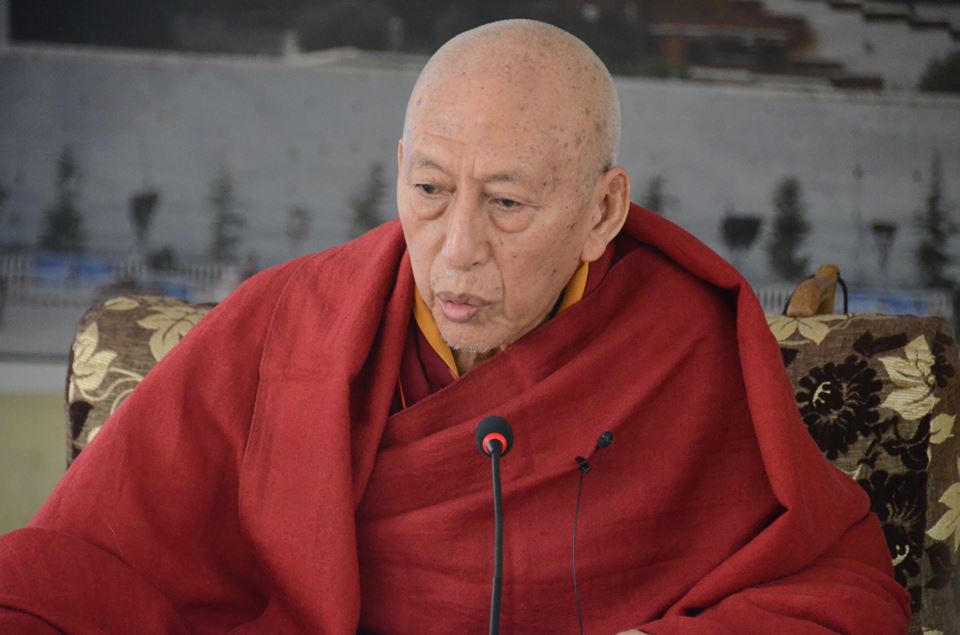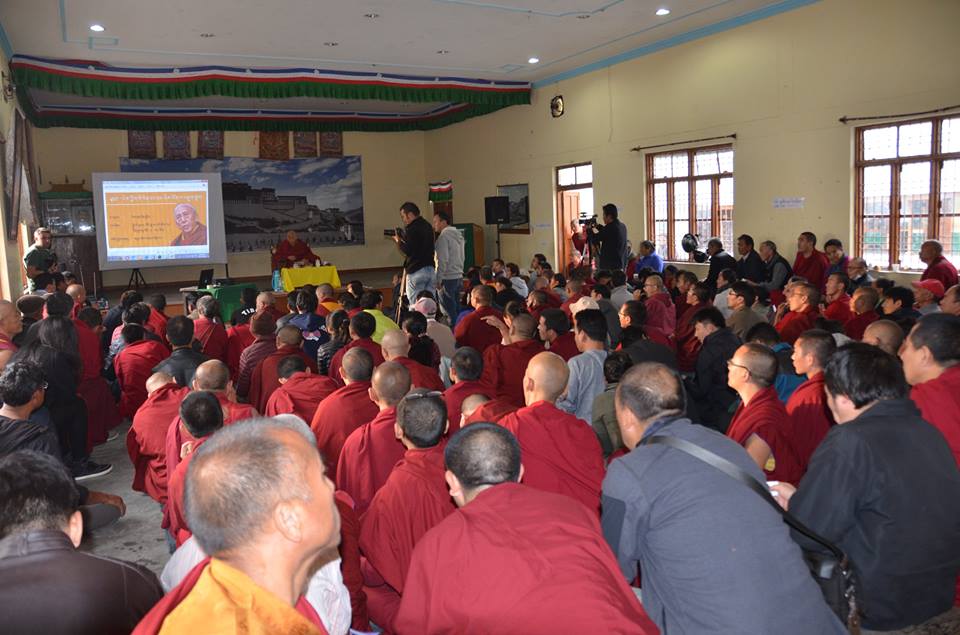“Value of reading, and the ways of engaging in education”
– A speech at the Exhibition of writings of His Holiness the Dalai Lama
30 October 2016
This afternoon His Eminence Prof. Samdhong Rinpoche gave a talk on the theme of “In relation with His Holiness the Dalai Lama’s benevolent activities, the value of reading books and the ways of engaging in education,” in the hall of Day School, McLeod Ganj, Dharamshala. His Eminence Rinpoche answered questions at the end of the talk.
The talk was convened by Mr. Gonpo Gyal, the organiser of “Exhibition of the Writings of His Holiness the Dalai Lama.”
In the introduction to the event, by Mr. Gonpo Gyal mentioned that he has been putting on since 2012 the Exhibition of the Writings of His Holiness the Dalai Lama, and outlined future plans with the project.
Thereafter His Eminence Prof. Samdhong Rinpoche began the talk. His Eminence said that it is estimated there are over 12,00 books comprising of His Holiness the Dalai Lama’s own writings, and the discourses, teachings, speeches, biographies, and writings by experts on His Holiness’ thoughts. There are writings by His Holiness, in both Tibetan and English, and those translated from these two languages into some sixty other languages. Rinpoche pointed out that the Tibetan society needs to know that there are people who say that they—those benefitted by those works—are disciples of His Holiness by virtue of the teachings received thus, and that it is important for Tibetans to study His Holiness’ writings.
On the value of reading books His Eminence Rinpoche gave the following advice:
The value of reading is generally well-known. Over ninety-nine per cent of Tibetans both at home and in exile have a genuine faith in His Holiness the Dalai Lama, yet it is possible that sometimes our faith may not be of the intelligent type, a kind of blind faith; His Holiness advises that we need to be a twenty-first century person; we must not confine ourselves to merely uttering “I go for refuge,” or being tearful when seeing His Holiness, rather it is important to do studies on His Holiness’ writings and teachings, which are the supreme of the deeds.
People in the West take so much interest in His Holiness’s writings and guidance in general, and more so regarding universal responsibility. Till date there has not been any Tibetan from the new younger generation and from the educated type who has done any research on the writings; perhaps it cannot be helped because we are at a time when we are imitating the West—if one does not know well how to imitate, there is the danger of becoming what a Tibetan saying describes, “I did not learn Her Highness the Madame’s style,/ And I, a girl, lost my own gait.//” We are at a time of being lost in the Western glitziness. It is perhaps possible that it may still take another several decades for our youth to realise our own value and have an understanding of our cultural values. After wandering everywhere, one finally has to return to one’s nest.
The stages of study are of two: reading, or to listen to a teacher; there is no third path. But it is difficult to have a teacher whom one can always access, or who is available timewise, and to be next to oneself all the time. Book is the most convenient teacher. Some teachers do scold, but a book does not; place it on one’s pillow, one can read it anytime.
Of the writings of His Holiness the Dalai Lama, The Universe in a Single Atom is about Buddhist science and modern science; Ethics for the New Millennium and The Art of Happiness;Beyond Religion: Ethics for a Whole World, and others are all inconceivably great books; most of these books are not in Tibetan. There is a ten-year project (2017 – 2027) going on to translate into Tibetan twenty of important writings of His Holiness the Dalai Lama. In general, since there are many among young Tibetans who know English, it would be good if they can look into those books. There is no better way of engaging in education, other than studies into them.
According to our tradition, the ways to engage in education is shown in these lines: “Abiding by ethics, through reflection/ One is led well to meditation//.” As the foundation, one needs to abide well by ethics, followed by learning, after which reflection (contemplation) is needed.
These days the stages of study are solely learning/hearing, there is nothing required to do after that. That is too convenient: there is the internet, online media and so forth—one can keep hearing (gathering information) for the entire 24 hours. But in our Buddhist abhidharma teachings it is said that the knowledge gained from mere hearing is not one’s own knowledge, it is a borrowed knowledge from others. To dwell only on the knowledge gained from hearing is akin to staying on a loan, it has no benefit to you. Knowledge gained from contemplation is one’s own knowledge.
Thereafter His Eminence Rinpoche touched upon the importance of book reading, and more so, as a Tibetan, to read works of His Holiness the Dalai Lama, and advised that in doing studies on His Holiness’s writings we would be able to have the faith risen from reasoning.
Over 200 people attended the talk.

